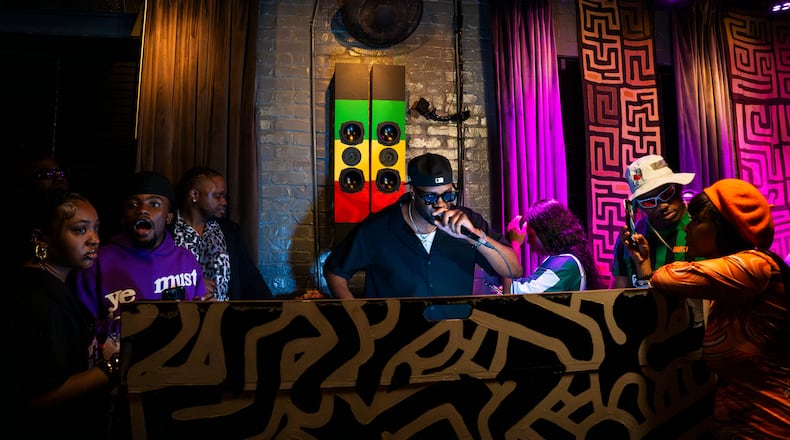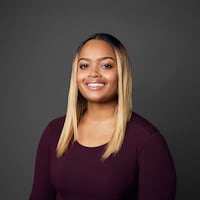On a chilly October night, the dimly lit lounge of Rock Steady — a popular Afro-Caribbean restaurant in Midtown — is notably empty. Staffers are preparing for what’s supposed to be a busy night ahead. It’s Tuesday. For most in Atlanta, it signifies just another day in the mundane work week.
But for others, Tuesday nights are all about Bamba Tuesdays, Atlanta’s popular dance party that celebrates the relentless rhythms of amapiano. The weekly event, formed in 2022, uses amapiano (a jazzy subgenre of South African house music) as a gateway to connect Atlanta audiences to the African diaspora.
Credit: Olivia Bowdoin
Credit: Olivia Bowdoin
Although the party had a 9 p.m. start time, the crowd didn’t pick up until 90 minutes later. For over three hours, Rock Steady’s small venue transformed into an epic African celebration where space and time became obsolete. Movement and music prevailed.
Attendees led impromptu dance routines with aplomb. Others stopped and stared — as if they were in a trance. An amapiano mix of Keyshia Cole’s 2005 R&B classic “Love” blared through the speakers. The bass thumped so loud that hearing anything else outside of it felt like trying to solve a Rubik’s Cube for the first time. But that’s the point. At Bamba Tuesdays, it’s all about the rhythm.
“This is not a party,” said DJ Kash, curator of Bamba Tuesdays, during his set. “This is a reunion with our ancestors.”
Bamba Tuesdays is one of the major players contributing to the rise of African music and culture in Atlanta. The city has emerged as a premier site in the country for uplifting the sounds and scenes derived from the continent.
Made in Africa
Afrobeats and amapiano are the most popular African music genres to make waves in the United States. The former (marked by its jovial, up-tempo beats that fuse American funk with West African soul and pop) emerged in Nigeria in the 1960s. The latter is a newer sound, tracing back to South Africa’s underground house scene in the mid-2010s. Amapiano is known for its hypnotic jazz-house soundscape. On TikTok, it’s become popular for the dances it inspires. The hashtag #amapiano has 2 million posts on the platform.
Both genres garnered mainstream attention in the late 2010s and continue to shape dance floors around the world.
On Spotify, Afrobeats has grown by more than 500% since 2017, surging to more than 15 billion streams last year. In 2022, Billboard introduced its U.S. Afrobeats Songs Chart, a weekly ranking of the top 50 Afrobeats songs in the country. This year, the Grammy Awards announced its first-ever category for African musicians: best African music performance; Johannesburg native Tyla, one of amapiano’s shining ambassadors, was the inaugural winner. Her hit 2023 song “Water” became the first South African solo song to enter the Billboard Hot 100 in 55 years, thanks to social media.
Superstars like Tyla, Burna Boy, Wizkid, Rema and Tems have boosted the genres’ popularity with hit songs and albums. And some of them have Atlanta roots. Davido, the Nigerian-raised icon whose 2017 single “Fall” became the first Afrobeats song to be certified gold, was born in Atlanta. Amaarae, the budding Ghanaian-American singer, was partially raised in Atlanta. With the remix to her 2020 hit “Sad Girlz Luv Money,” she became the first Ghanaian singer to have a song on the Billboard Hot 100.
Credit: Isaiah Johns
Credit: Isaiah Johns
The 30-year-old artist’s expansive Afro-pop sound (as seamlessly showcased on her 2023 LP “Fountain Baby”) heavily derives from her time in Atlanta. Amaarae spent most of her college years in the metro area, where she attended Agnes Scott College in Decatur. She said Atlanta was the first place she noticed the rise of African music in America.
“That’s when I saw Wiz Kid come to Atlanta for a concert, Davido come to Atlanta for a concert, Stonebwoy come to Atlanta for a concert, like all the artists — that was their first point of contact, even before New York, which people would argue has more Africans,” she said. “Everyone was coming to Atlanta first.”
Helping pave the way for African culture in Atlanta are the African Student Associations (ASA) on Georgia’s college campuses, said Amaarae. Nigerian-American Adanna Charles-Ezeoke is the outreach coordinator for GSU’s ASA, which.formed in 1990 and hosts events throughout the year, like its flagship Taste of Africa. The annual celebration showcases African culture through dance, fashion and drama. Today, GSU’s ASA has more than 400 members. Charles-Ezeoke described the group’s intergenerational impact and community as comparable to that of sororities and fraternities.
“Everyone in this organization is really bounded by the fact that we’re all from Africa. We are all under the same roof. We all have the same heritage ... the legacy really speaks for itself.”
Since joining ASA, Charles-Ezeoke sees African culture continuing to grow in Atlanta.
“That’s the first place you come to meet people who are like-minded like you and are driven like you. From there, you form it into something more. Each year, it just gets bigger and bigger because there’s so many collaborations we’ve seen with all the ASAs across the board. The impact that ASAs have is in bringing all African students together under one.”
Diversity in the ‘Black Mecca’
Atlanta’s African music scene is as spacious as it is welcoming. There’s room for everyone. From the dance classes to nightlife to college campuses, Atlanta has emerged as a formidable hub for celebrating a culture that goes beyond the Black American experience.
A 2022 Pew Research Center report revealed that Atlanta was ranked the fourth U.S. metro area with the largest Black immigrant population (190,000), one that has grown 165% since 2010. It’s a demographic that DJ Kash, who’s Haitian and grew up in New York City before moving to Atlanta, knew would continue to rise after hosting his own international radio show on V-103 in 2012.
He recalls the phone lines “blowing up” during his show. DJ Kash now hosts Bamba Radio on the station.
“(Listeners) were supportive, and the non-Africans and Caribbeans loved it as well,” he said. “I really feel like that’s a myth that Atlanta is just a trap city. When you travel, people think Atlanta just listens to trap music 24/7, but Atlanta definitely embraces the international sound.”
Kash argues that Atlanta has a bigger grasp on African culture than his hometown New York City.
“Even though New York was playing it on the radio more frequent(ly) than us, we were kind of moving the needle, culturally, with the African sound because you would hear African music all over the place, like in clubs, since 2012. What makes that beautiful is that those clubs are owned by Africans, too.”
That’s part of why he started Bamba Tuesdays. He wanted to create a spot that deepens Atlanta’s embrace of the culture. Kash discovered the music while on a trip to Qatar in 2019 and instantly fell in love it.
“It just spoke to my soul. I knew the city needed this type of vibration.” Nearly 1,200 people attend his functions, between his weekly parties and monthly one-offs.
Credit: Olivia Bowdoin
Credit: Olivia Bowdoin
Cece Tor-Herbert frequents Bamba Tuesdays and other Afrobeats and amapiano events in the city. Since 2010, the choreographer and influencer has taught some of the first Afro-dance classes offered in the city. Tor-Herbert, a first-generation Liberian-American, was born in Sacramento, California, before moving to Atlanta as a preteen. She said it was Atlanta that gave her the first taste in African music and nightlife.
Tor-Herbert cites Atlanta’s growing African immigrant population, party series like Bamba Tuesdays or Girls Love AMA, and lounges like Red Room and Ace Atlanta for pushing the culture forward.
However, she notes one element that’s integral to keeping those scenes afloat: dance.
“It means so much to the music because a lot of these songs are catapulted by dance challenges and people dancing to the music and posting it on their social media, making other people smile, making other people feel good. A lot of these music successes have to do with dancers. Dancers are the heartbeat. We’re like the physical drum of the music.”
Tor-Herbert specializes in Afro-fusion choreography — a blend of several street and social dance styles (i.e. konto and shaku from Nigeria, azonto from Ghana and kuduro from Angola). When she began her classes over a decade ago, she’d host them every week. But now, as her profile has risen online, she travels around the world teaching the art of African dance. Her dance videos have garnered more than 1 million likes on TikTok.
She still aims to teach classes in Atlanta, focusing on curated events like the popular global party series Everyday People.
Credit: HYOSUB SHIN / AJC
Credit: HYOSUB SHIN / AJC
“I feel like (people) want to feel something when they go out. They want to be entertained. It’s not enough to just go to the club and pop bottles anymore. People actually want to have a good time. There’s so much going on in the world right now. People are dealing with their own personal struggles ... the dancers are the conduit of bringing that light to the parties.”
From community to career
Atlanta’s African scene isn’t just in the movement and parties that it inspires. It’s seen in the budding musicians, too. Ms. Kumi is a rising Ghanaian-American singer who describes her music as Afro-R&B. The Atlanta native listened to a mix of Mary J. Blige, Jazmine Sullivan, Tiwa Savage, Tems and wanted to find a way to combine the two cultures. Ms. Kumi dropped her first Afro song, “Premium,” in 2019.
Credit: Handout
Credit: Handout
An alumna of Georgia State University, Ms. Kumi also thanks the school’s ASA for being the first place to embrace her African heritage. During her senior year, she served as the organization’s treasurer. At the time, she said there were more than 200 students in the group who were welcoming to all cultures.
“It was all different African countries, from West Africa, Nigeria, Ghana East Africans, Kenya, Ethiopia. It’s so many different countries within the continent of Africa able to showcase themselves, and I think that’s what’s beautiful. On the campus, when you’re around students all day and able to embrace your culture, and that’s rubbing off on the other 20-somethings, it made sense to bridge that gap.”
Trying to become a big African music artist in the U.S. does yield challenges like language barriers and being in a relatively new genre. However, Ms. Kumi said living in Atlanta, a city known for its music scene, brings abundant opportunities.
“I think Afro music can resonate with different crowds in Atlanta, because, again, we are so diverse, and it’s not just one type of Black person here. It’s different cultures and different backgrounds. If you find your people and find your community, I think you can grow and blossom here as an African artist.”
Credit: HYOSUB SHIN / AJC
Credit: HYOSUB SHIN / AJC
AFRICAN MUSIC EVENTS
Bamba Tuesdays. 9 p.m. every Tuesday. Free with RSVP. Rock Steady, 907 Marietta St. NW, Atlanta. 470-788-8120. rocksteadyatl.com
Davido & Friends. 8 p.m. Nov. 21. $60-$300. State Farm Arena, 1 State Farm Drive, Atlanta. 404-878-3000, www.statefarmarena.com
About the Author
Keep Reading
The Latest
Featured









